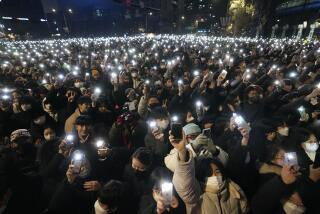A New Year’s Story
- Share via
All through our New Year’s Eve party and the wine tasting and tiny cakes heaped on large plates around the dining room, the message he relayed earlier that evening stayed with me, wouldn’t let go. They were haunting words, honed by cruelty, sinking their claws in till each syllable hurt. She said for you not to call, that she’d call again later.
I had tried to untangle my father’s words from hers, tried to make out the embittered, evasive accent in her voice whenever I asked where she’d been and she wouldn’t exactly say but knew how to make you feel peevish for asking. I wondered whether he had diluted and blandified her message out of kindness for me or whether, mistaking her elated familiarity on the phone for something more genuine, had failed to see that “later” didn’t just mean “not now” or “as soon as I get a chance” but “perhaps, never, don’t hold me to it, don’t push me!”
He had told me of her call as we were moving the bottles of wine into the balcony. I pretended not to heed him at first. He thought I hadn’t heard and repeated her message. Again I ho-hummed him. “I think,” he finally said, hesitating as he helped me move more bottles, making sure that nothing disturbed the large red stickers that covered the names of 16 Beaujolais Nouveaux with numbers written in a trembling hand’s imitation Gothic. “I think she’s not coming tonight.” I watched him tense and look away. He knew I had heard him the first time. To pretend now that I still hadn’t heard would betray how deeply his message cut. “Oh, I don’t know,” I intoned. “Besides, how do you know she’s not coming?” I asked, trying to sound amused at the old man’s adolescent fears. I tried to seem absorbed by one of the more obstinate labels that kept curling up each time I pressed it down. “How do I know?” he added, almost exacerbated by my refusal to face facts. “Because she said for you not to call--that’s how I know.” He placed his finger next to mine on the red label the way someone automatically does when helping another tie a difficult knot, his way of mending a momentary loss of temper.
But he had guessed right. As I had.
“Look, you always knew it would come to this.”
I nodded. Yes, I had always known it would come to this. I had known when I met her, known it that one night when she said she didn’t think it might lead to anything, had known it last year even when we celebrated New Year’s in this very room, with the same exact crowd of people, sipping last year’s vintage as though none of this might ever happen.
“She’s not coming,” whispers my father. My mother says nothing. Her tact, her absence of surprise, tell me she too had been expecting it.
“So we’ll have fun without her.” Pause. “As if she was so much fun anyway.”
That was gratuitous. Mother immediately shoots him a chiding glance. “I’m not making it up. The girl was a pill.” A second glance shuts him up.
Last year, in the kitchen, as she was helping my mother wrap colored paper napkins around each set of silverware while a Brazilian guest was putting the finishing touches to the bombino, my father had come from behind her, laid both hands on her hips, spun her gently around and proceeded to dance a few steps with her in the kitchen through the pantry and into the dining room. He’d done the same with my mother and the Brazilian. What surprised me was the way all three had readily acquiesced, all of them wearing that same startled and indulgent smile of women willing to humor a man’s rakish whim if he promises to be done before the guests arrive.
I remembered how we laid out the bottles of wine on the balcony after she had helped me number the mystery labels and how we kept opening bottle after bottle once the blind test got out of hand, which always happens, the crowd agreeing that the bottle numbered 1 was as good as No. 6, but that No. 12 was the best, my father and I always disagreeing, some people no longer really caring, because the test was always a success, would always be a success, was just another way of putting a good spin on the fact that a part of us always dies in December.
The year before had been dreadful. It occurred to me now that next year might be dreadful as well. I had lived as on a floating island in between the two. I was back to square one.
The phone rings. It can only be her. I catch my parents exchange a meaningful look across the crowded room. It isn’t her.
“You know she won’t call,” he says, reading my mind. I wondered how a woman who had slipped so easily into my world could just as easily never call, forget to call, not care to call, slip back into the very night from which she’d arisen.
I remembered the care with which he lays out his various wine tools on one of the counters in the dining room before the party, cleaning the corkscrews and the various foil cutters. She had compared him to a mohel laying out tools for a complicated operation, not realizing that she had displaced Mother’s old joke about a hunter polishing his rifles and gear on the eve of a hunt.
The joke comes back to haunt us now. We miss her, the way we miss how she laughed at her own joke about mohels or about Jews celebrating the Christian New Year’s.
“What are we ever going to do with all this open wine?” he asks at the end of the party. Someone always answers “Beef Bourguignon.”
After the last guest leaves, my parents slump. Mother wants to clean up in the morning. My father says he’ll look after things himself. My brother and sister-in-law have gotten out of this year’s cleanup again by offering to drive home some of the guests who drank too much. I remember last year at 3 in the morning how she and I insisted that my parents go to bed, both of us drying the dishes as I asked if she minded terribly.
Mother’s gone to bed and my father and I are by ourselves in the kitchen. “This may sound inappropriate,” he finally says, though I’ve no idea what he’s about to say, “and it’s probably premature, and none of my business--but would it help if I said that it will go away?”
I look at him, saying nothing. The silence weighs on us. “Just give it some time. One eventually . . . forgets.” Again he hesitates. “Not that you forget or unlove anyone in life. You just find others to love. And even that’s not hard. What’s hard is having to start all over again.”
He and I are nursing the same thoughts tonight. It pleases me. New Year’s is not a holy night, and no one tries to think too clearly about these things, but after the heady company of good friends has left, and the laughter subsides, each of us finds a way of marking time in his own little ledger, measuring how we age, what we lose, where we fail and how little we’ve got of what we want in life--or whether it’s still wise to hold out for it still.
I look at him and think of the years to come, of next year’s New Year’s, and of last year’s, and of those of so many years ago, and of the years when I’ll look back on tonight and remember him finally saying, “Next year, you’ll see, all this will seem so far away. And the funny thing is--you’ll even wish some of the pain had stayed.”


